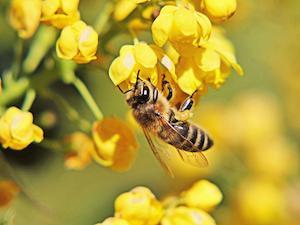City of Alpharetta recently issued the following announcement.
With the arrival of Spring, the swarm season for honeybees has begun. The City has received calls from residents this week regarding sightings of bee swarms and asking a lot of questions about what is happening and what they should do.
The first thing to know is that there is no need for fear or concern, as what is being seen are honeybees looking for a new place to setup a hive. Swarming honeybees are generally calm, as they have two main goals, find a permanent new home and protect the queen if threatened.
Honeybees are the only type of bee that swarms. It is part of their reproductive strategy in which the bees create two or more new colonies or hives from an original one. The swarmed bees form a temporary cluster or bivouac prior to moving into more permanent housing. While the bees bivouac, scout bees are searching the area looking for an optimal new home that has a few basic features:
* At least 2,400 cubic inches of living space
* An entrance approximately 10-feet off the ground
* An entrance large enough for the honeybees to come and go
* An entrance small enough to reduce drafts and for the bees to be able to defend
Unfortunately, that optimal new home sometimes ends up being inside the walls or joists of someone’s house. Because that can result in the need for an expensive extraction, homes should be carefully inspected periodically to identify and repair all openings, even very small ones, that bees can use to gain access.
If you come across a swarm or bivouac in a problematic location, the City may be able to help. We have contact with several professional beekeepers who like to collect swarms because they are free bees that they can add to their operation and increase honey production. Often times, they are willing and able to relocate the bees for free. Relocating the swarm is preferred because:
* The honeybee colony is less likely to end up making their home in somebody’s house
* The colony is more likely to survive if lives in a beekeeper’s hive where it can be tested for Varroa mites and diseases that currently devastate colonies
* With the help of a beekeeper, the swarm colony can produce an excess of honey (that beekeepers keep and make available to consumers like you)
Original source can be found here.





 Alerts Sign-up
Alerts Sign-up